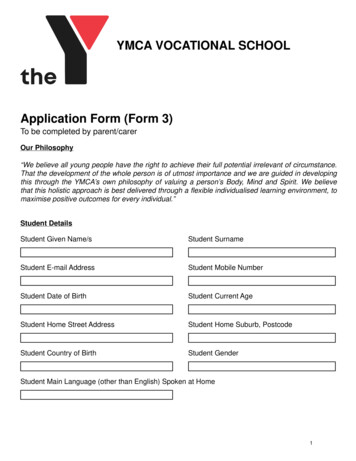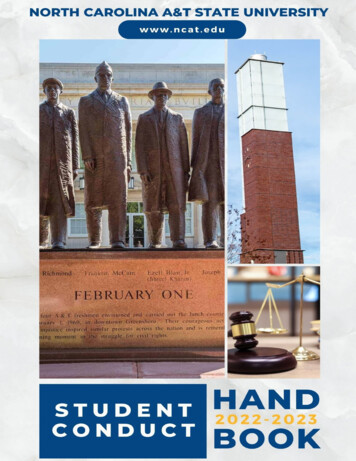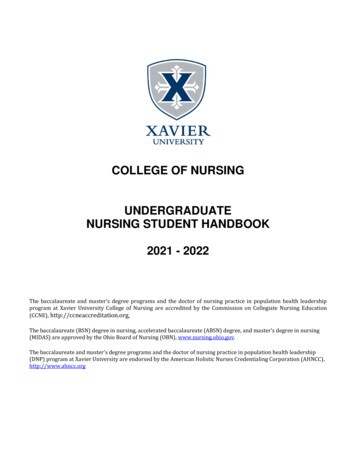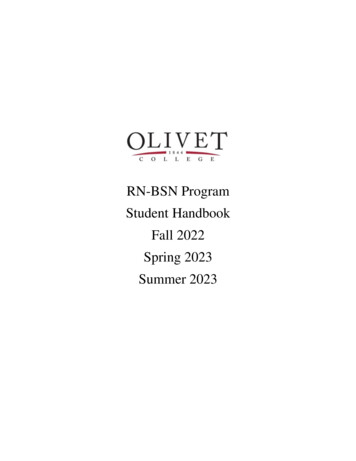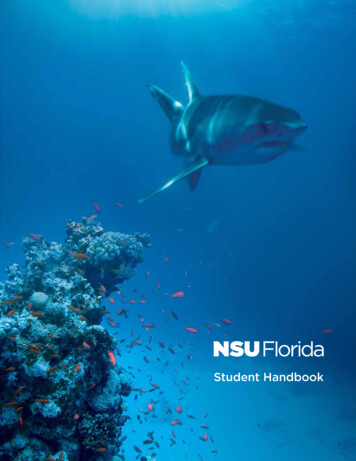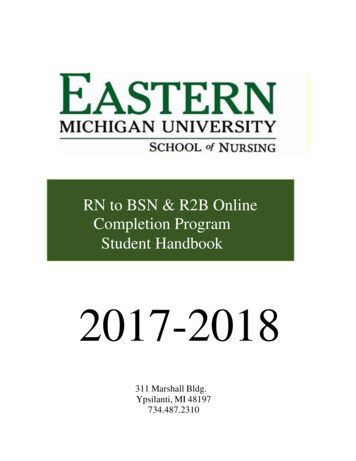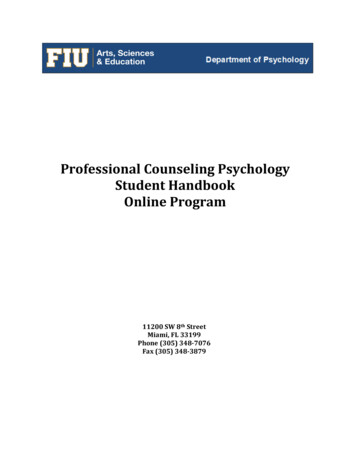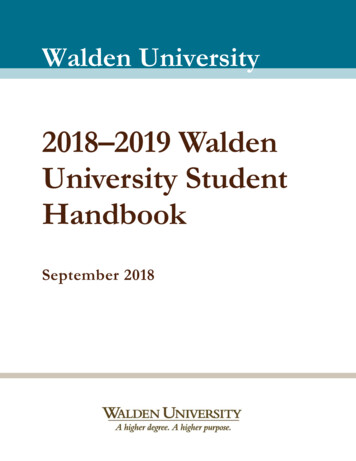
Transcription
Capital Area North Doctorate inEducational LeadershipStudent Handbook
Table of ContentsI.INTRODUCTION . 3II.HISTORY OF THE PROGRAM .3III.MISSION & VISION STATEMENT 31) Program Objectives . 3IV.FACULTY & STAFF CONTACT .41) Core Faculty Contact Information & Courses Taught . 42) Staff Contact . 5V.DEGREE REQUIREMENTS 61) Admissions Requirements . 6a) Supplemental Information .7b) Applicant Interviews 72) Dissertation Plan B 73) Course Requirements . 8a) Core Courses Years I & II .8b) Courses Years III .8c) Electives . 8d) Summary 9e) Evaluation .94) Special Requirements . 95) Committees . 96) Advising Structure & Mentoring . 107) Advancement to Candidacy . 10a) Dissertation Prospectus . 10b) Qualifying Examination . 11c) Scheduling and Deadlines . 11d) Qualifying Examination Outcome 118) The Dissertation . 129) Normative Time to Degree . 1210) Typical Timeline & Sequence of Events . 1311) Sources of Funding . 1412) PELP, In Absentia, and Filing Fee Status . 141
VI.PROGRAM RESOURCES . 151) Building Locations . 152) Copying . 153) Student Computer Lab . 154) Keys . 15VII.WHAT TO DO AFTER YOU ARE ADMITTED. 161) Submit your Statement of Intent to Register. 162) Submit your Statement of Legal Residence. 163) Set Up Your Student Account and Email. 164) Forward your E mail to a Personal Address. 165) Check your UC Davis E mail Address. 166) Set Up Your Library Privileges at UCD and SSU. 167) Register for Courses and Pay Fees.178) Keep Us Informed of Contact Information Changes. 179) Submit a FAFSA (Free App for Federal Student Aid) . 17VIII.FREQUENTLY ASKED QUESTIONS (FAQ’s) . . 171) Program Cost and Financial Aid. 172) Administrative Credential. 183) Summer Intensive & Kick Off Activities. 184) Program Details & Procedures. 185) Extended Leaves & Absences. 196) Grading Procedures & Expectations. 207) Keeping Up With Coursework. 208) Class Participation & Expectations. 219) The IRB Process. 2210) The Dissertation Process. 2211) Graduation . 23INDEX . 252
I.INTRODUCTIONWelcome to the Capital Area North Doctorate in Educational Leadership (CANDEL) Program, a JointDoctorate between University of California, Davis and Sonoma State University. This handbook will giveyou an overview and background on the program in educational leadership, and it will assist both youand our faculty advisers in understanding program requirements. This handbook is designed tosupplement the more general Graduate Student Handbook available on the Office of Graduate Studieswebsite: ndex.html.II.HISTORY OF THE PROGRAMThe CANDEL Program began in 2001‐2002. The CSU and UC systems came together in response tolegislation allowing joint doctoral programs in educational leadership to be operated in the state ofCalifornia. This legislation sought answers to questions about emerging needs for educational leaders forour P‐12 and community college systems. In particular, new leaders will have to be well versed in thecomplex issues facing these institutions and a research‐to‐practice perspective to address these issues.Having UCD and SSU working together in a joint doctoral program was founded upon the belief thatcombining the resources and expertise of these two major institutions would bring a variety ofperspectives and expertise together to focus on the leadership needs for students in our P‐14 system.CANDEL admitted its first class of doctoral students in 2005. It has since welcomed candidates in eachyear thereafter.The program is approved through UC’s CCGA, the two‐system CSU/UC Joint Ed. D. Board, and CPEC and isaccredited via the Western Association of Schools and Colleges (WASC).III.MISSION & VISION STATEMENTOur common purpose is to produce exemplary leaders who question how we typically “do business” ineducation, seek and understand alternative ideas and explanations on which new kinds of changes couldbe made to truly impact our institutions and students.1)Program ObjectivesThe curriculum is then constructed around four overarching and inter‐related themes. These are integralto the academic and professional development of educational leaders: Visionary Leadership and ManagementPolicy into PracticeData for Decision‐MakingBuilding Community in a Diverse Society3
Each course in the curriculum is tied to one or more of these themes. Each is reinforced by tailoredlearning outcomes. Each promotes student knowledge and skill acquisition that joins theory and practiceand thought and action, concurrently helping students incorporate data and assessment practices intotheir daily decision‐making. Courses utilize problem‐based and case study learning approaches,grounded in the realities of schools and community colleges. The desired result is that these emergingleaders for change would then encourage meaningful solutions to contemporary educational problems.IV.1)FACULTY & STAFF CONTACTCore Faculty Contact Information & Courses TaughtFaculty teaching or serving on dissertation committees in the program must be members of therespective faculty of Sonoma State University or University of California, Davis. Each core facultymembers is approved by the Core faculty, as a whole. Following is a list of current Core Faculty, which isupdated annually. Courses taught also varies from year to yearDr. Jamal AbediProfessor, UC Davis ‐ Quantitative Research(jabedi@ucdavis.edu, 530.754.9150)Dr. Carlos AyalaInterim Dean, Sonoma State ‐ Quantitative Research(carlos.ayala@sonoma.edu, 707.664.2132)Heather Edwards, Esq. Faculty Member, Sonoma State ‐ Law & Ethics(edwards@girardedwards.com)Dr. Kerry EnrightAssistant Professor, UC Davis ‐ Qualitative Research(kaenright@ucdavis.edu)Dr. Janet GongFaculty Member, Sonoma State – Problem Based, Student Services,Dissertation Seminar(jangong@ucdavis.edu)Dr. Paul HeckmanCo‐Director, Professor, UC Davis – Data Driven Decision Making,Dissertation Seminar, Problem Based Leadership(paheckman@ucdavis.edu, 530.752.8309)Dr. Michal Kurlaender Associate Professor, UC Davis ‐ Research Design(mkurlaender@ucdavis.edu, 530.752.3748)Dr. Paula LaneAssociate Professor, Sonoma State ‐ Qualitative Research(paula.lane@sonoma.edu, 707.664.3292)4
Dr. Viki MonteraAssistant Professor, Sonoma State ‐ Learning AcrossCommunities, Curriculum & Instruction(vlmontera@sonoma.edu 707.664.3255)Dr. Paul PorterCo‐Director, Professor, Sonoma State – Contemporary EducationalLeadership, Dissertation Seminar, Problem Based Leadership(paul.porter@sonoma.edu, 707.664.3270)Dr. Gloria RodriguezAssociate Professor, UC Davis ‐ Finance & Budget, Diversity(gmrodriguez@ucdavis.edu, 530.754.6256)Dr. Heather RoseAssistant Professor, UC Davis Influencing Policy(hmrose@ucdavis.edu, 530.752.1407)Dr. Tom TimarProfessor, UC Davis ‐ History of Policy(tbtimar@ucdavis.edu, 530.754.6654)Dr. John WagnerProfessor, UC Davis ‐ Qualitative ResearchDr. Karen Watson‐Gegeo Professor, UC Davis Qualitative Research(kawatsongegeo@ucdavis.edu, 510.527.5076)Dr. Phil YoungProfessor, UC Davis Human Resources, Research Design(jpyoung@ucdavis.edu, 530.752.5957)2) Faculty VitaeMost faculty vitae are found on our website: dd/candel‐faculty . Please contact either program coordinator at candeledd@ucdavis.edu ifthere is a particular vita not listed or if you need additional information.3)Staff ContactAmelia SwearingenRosemary GaltenProgram Coordinator, UC Davis(aaswearingen@ucdavis.edu, 530.754.6664)Program Coordinator, Sonoma State(galtenr@sonoma.edu, 707.664.4051)For More information on the Schools of Education forUC Davis, please visit: http://education.ucdavis.edu/ or call (530) 752‐5887Sonoma State, please visit: http://www.sonoma.edu/education/ or call (707) 664‐31155
V.DEGREE REQUIREMENTSNote About the Degree RequirementsIn June 2010, the CANDEL program re‐wrote its Degree Requirements and had them approved by UCDavis Graduate Council. It is Graduate Council’s policy that a student may choose to fulfill GraduateCouncil’s approved program requirements that were in effect at the time he/she first enrolled in thatprogram at UC Davis or may choose the new degree requirements. This policy allows the student tobenefit by changes that best assist him/her in completing degree requirements and also allow long‐termplanning of a program of study. In addition, this policy prevents the student from being penalized bychanges that have been enacted after their enrollment.If a program makes a change in the curriculum prior to a student completing the Qualifying Examination,the student may elect to continue the current degree requirements and program or switch to the newdegree requirements and program for completion of his or her program.The Degree Requirements for Cohorts 1‐5 are available by requesting them from Student Services.Revised: November 17, 2004; April 2010Graduate Council Approval: June 18, 20101)Admissions RequirementsApplications shall be submitted and reviewed by UC Davis Graduate Studies. Thereafter, theAdmissions Committee, hosted by UC Davis, will include representatives from UC Davis and SonomaState University. Faculty representatives from both campuses will screen all applications and willmake recommendations for admittance. Candidates who meet the highest standards and reflect theeconomic and cultural diversity of Northern California will be encouraged to apply.The following qualifications are required:1. Earned baccalaureate and master’s degrees from accredited institutions of higher education2. Minimum grade point average (GPA/4‐point scale) for admission to UC. Any of the followingcriteria are sufficient to establish admissibility: A 3.0 GPA for all undergraduate coursework;A 3.0 GPA for all upper division, undergraduate coursework;A 3.0 GPA for all upper division coursework taken during the last two years of anundergraduate degree; orA 3.5 GPA in all coursework taken in a completed master’s degree,irrespective of undergraduate performance6
3. Undergraduate and/or graduate experience, reflected in coursework or student leadershipexperience, that demonstrates the individual’s capacity to undertake graduate study ineducational leadership (e.g., experience with service groups, student government, or paidpositions leading group activities)4. Prior experience in administrative or leadership roles in an educational institution or relatedsetting, such as department chair, Dean, principal, teacher, union officer, and/or program sitecoordinator5. A completed UC Davis Graduate Studies online application for admissions, which includes thefollowing: A personal history statement A statement of purpose outlining the applicant’s professional history, goals, and jobaspirations A statement describing the applicant’s interest in the program and how s/he expects tocontribute to the program overall Three letters of recommendation attesting to the leadership and scholarship ability ofthe candidate A resume An application fee GRE or MAT scores Official undergraduate and graduate transcripts, as appropriatePreferred qualifications for P‐12 administrators include an administrative credential. Forcommunity college administrators and P‐12 applicants, preferred qualifications include evidence ofparticipation in leadership positions.a) Supplemental InformationA statement of support for academic studies from the candidate’s employer (e.g., school district,county office of education, other school consortia of employment or community college district)is encouraged.b) Applicant InterviewsAfter an initial screening process, selected applicants will be individually interviewed to furtherconsider their admission.2)Dissertation Plan BPlan B specifies a three‐member dissertation committee and an optional final oral examination. Thedecision on whether to require the final oral examination is made on an individual student basis bythe dissertation committee. There is no exit seminar required.7
3)Course Requirements (84 required units)CANDEL coursework follows a cohort model in which entering students proceed through theprogram concurrently and as a cohesive unit. During years I and II, students will take three coursesper quarter for a total of 12 units.a) Core Courses—Years I & II (72 Beginning Issues and Practices: Contemporary Educational Leadership (4)Policy: History and Theory of Educational Policy (4)Beginning Issues and Practices: Diversity Issues for Educational Leaders (4)Inquiry and Practice: Research Design and Application for Educational Leaders (4)Inquiry and Practice: Qualitative Research for Educational Leaders (4)Inquiry and Practice: Quantitative Research for Educational Leaders (4)Beginning Issues and Practices: Ethical Leadership and Dilemmas inComplex Organizations (4)Policy: Formulating and Influencing Policy (4)Advanced Issues and Practices: Leadership Across Communities (4)Organizational Structures and Change: Data‐Driven Decision‐Making forEducational Change (4)Problem‐Based Learning Course: Part 1 (4)Problem‐Based Learning Course: Part 2 (4)Problem‐Based Learning Course: Part 3 (4)Organizational Structures and Change: Curriculum & Instruction Issues in Education (4)Educational Finance, Human Resources, and Law: Human Resources and LegalIssues in Education (4)Advanced Issues and Practices: Leadership and Student Services/Affairs (4)Educational Finance, Human Resources, and Law: Integrated Seminar: Human andFinancial Assets, Allocations, and Budgets (4)Policy: Possibilities and Limitations of Educational Policy in a Democracy (4)b) Courses—Years III (12 units)After Core courses are completed, but before advancing to candidacy, students must register in a12‐unit CANDEL Dissertation Seminar (EDU 287). To maintain full‐time status after advancementto candidacy, a student may choose to register in another non‐CANDEL graduate‐level course orcontinue in EDU 287D.c) ElectivesThere are no elective course requirements for the CANDEL program.8
d) SummaryEach student is required to take the 72 units of required coursework in years I and II, followed bythe 12‐unit dissertation seminar for a total of 84 units. See section 10 below for the typicaltimeline of coursework.e) Evaluation: At the end of Year I, each student will be evaluated by the UC Davis Co‐Director inhis/her role as Graduate Advisor. This evaluation will be made in consultation with the SonomaState Co‐Director. At this time, students not making adequate doctoral progress will be identifiedand will be notified that they are not making adequate progress. The students will be asked tomeet in person with the Co‐Directors to develop a strategy for rectifying the lack of progress.During that meeting, steps to address the inadequate doctoral progress will be agreed upon,documented, and conveyed in person and in writing. The following January, the student(s) willagain meet with the Co‐Directors to review progress. If all steps agreed upon have been taken andthe student’s progress is then satisfactory, the student will be informed in person and in writing. Ifnot, in consultation with Graduate Studies, the Co‐Directors will recommend for disqualification.4)Special RequirementsNone.5)CommitteesExecutive Committee: The Executive Committee membership is composed of the UC DavisCANDEL Co‐Director, the Sonoma State CANDEL Co‐Director, and CANDEL faculty members fromeach campus. The Executive Committee determines the structure of the program and anysubsequent changes to this structure in accordance with the program’s approved bylaws.Admissions Committee: The Executive Committee acts as the Admissions Committee. TheCommittee screens all complete applications and recommends candidates for interviews andadmission.Interview Committee: The Interview Committee consists of the CANDEL Directors and at least twofaculty members. Teams of two Interview Committee members interview the applicants.Qualifying Exam Committee: The membership of the Qualifying Examination Committee isnominated by the Executive Committee and is submitted to the UC Davis Office of Graduate Studiesfor formal appointment in accordance with the policies and procedures of the UC Davis GraduateCouncil and Office of Graduate Studies. The committee consists of five CANDEL faculty members (atleast two members from UC and two members from Sonoma State). The committee members,including the committee chair, design and score the oral Qualifying Examination for the cohort,although each student is examined individually. Care will be taken to assure that the QualifyingExam Committee is composed of members who can relate to all students’ areas of researchinterests.9
Dissertation Committee: The student nominates a Dissertation Chair and two additionalDissertation Committee members. Those nominations are submitted to the UC Davis Office ofGraduate Studies for formal appointment, in accordance with the policies and procedures of UCDavis Graduate Council and the Office of Graduate Studies.The Dissertation Committee is composed of three members, including the Chair, with at least onemember from each campus. The Dissertation Chair supervises the student’s research anddissertation, following the policies of UC Davis Graduate Council and Office of Graduate Studies, andserves as the principal guide for dissertation work. The Dissertation Chair cannot serve as chair ofthe Qualifying Exam Committee. The Dissertation Committee must reach a unanimous decision inorder to award the degree to the student.6)Advising Structure and MentoringGraduate Advisor: The UC Davis Co‐Director of the CANDEL program serves as the GraduateAdvisor and is a resource for information on academic requirements, policies and procedures, andregistration information.Dissertation Chair: The Dissertation Chair is the faculty member who supervises the student’sresearch and dissertation and serves as the chair of the Dissertation Committee. See “DissertationCommittee” above for more information.Mentoring Guidelines: The program has adopted the UC Davis Graduate Council’s MentoringGuidelines on the Web at toring.pdf7)Advancement to CandidacyThe student will be advanced to candidacy upon completion of the Qualifying Examination and allother degree requirements, with the exception of the dissertation. The Qualifying Examination istaken during the fall quarter of Year III (7th quarter).An Application for Advancement to Candidacy, along with the candidacy fee, must be submitted toand approved by the Office of Graduate Studies before advancement can occur.a) Dissertation ProspectusOne month prior to the Qualifying Exam, the student must submit a dissertation prospectus to the MajorProfessor/Proposed Dissertation Chair. The prospectus should include (1) a clear exposition of theproblem and research questions guiding the proposed research, (2) a discussion of the researchliterature related to the problem and the research questions, (3) identification and discussion of therelevant research methodology to be used in data collection and analysis, and (4) an explication of thesignificance of the study and any anticipated implications for practice, policy, and research.After approval by the Major Professor/Proposed Dissertation Chair, the final prospectus will bedistributed to the Qualifying Examination Committee no later than two weeks before the oral exam.10
b) Qualifying ExaminationThis 2–3 hour oral examination is conducted by the five‐member Qualifying ExaminationCommittee. The Qualifying Examination Committee will vote on the outcome immediatelyfollowing the exam. Non‐voting faculty observers may be invited with the unanimous consent ofthe committee and student.i) Scope of the Qualifying Examination: During the examination, the committee will questionthe student about the specific problems, issues, and research literature that comprise thefocus of the CANDEL coursework. The student will be expected to discuss in detail significantresearch literature and studies that inform his/her understanding of the issues exploredduring the course of study. Additionally, students will outline additional research andpractice that might help fully address these highlighted issues.In addition to answering questions from the committee, the student will also present his/herdissertation prospectus during the Qualifying Exam. The student will explore with thecommittee the nature of the problem addressed in the prospectus, as well as the researchquestions guiding the proposed study, the related research literature, the proposed researchmethods for collecting and analyzing data, and the student’s explanation for the significanceof the study for practice, policy, and research.c) Scheduling and DeadlinesAfter the Dissertation Chair has approved a final draft of the dissertation prospectus, the studentshould consult with the graduate program coordinator in the UC Davis School of EducationStudent Services office for help with scheduling the exam date. The student must receive noticeof admission to the Qualifying Examination from the Office of Graduate Studies before the examcan take place. It can take up to eight weeks for Graduate Studies to process the application.d) Qualifying Examination OutcomeThe committee, having reached a unanimous decision, shall inform the student of its decision as“Pass” (no conditions may be appended to this decision), “Not Pass” (the Chair’s report shouldspecify whether the student is required to retake all or part of the examination, list anyadditional requirements, and state the exact timeline for completion of requirements to achievea “Pass”) or “Fail.” If a unanimous decision takes the form of “Not Pass” or “Fail”, the Chair of theQualifying Examination committee must include in its report a specific statement, agreed to byall members of the committee, explaining its decision, and must inform the student of itsdecision. Having received a “Not Pass”, the student may attempt the Qualifying Examination oneadditional time. After a second examination, a vote of “Not Pass” is unacceptable; only “Pass” or“Fail” is recognized. Only one retake of the qualifying examination is allowed. Students receivinga “Fail” on the second attempt will be recommended to the Dean of Graduate Studies fordisqualification from the graduate program.11
8)The DissertationThe dissertation must be a major research‐based project that is relevant to a current, real problemwithin a P‐12 or Community College setting. The intent of the dissertation is to create applicableknowledge, remedies, or change strategies in service to an existing educational problem, policy, orsetting. It can address issues of internal management and leadership pertaining to a single school ordistrict, or to a policy issue with broad‐based salience within the education community.9)Normative Time to DegreeStudents complete the program in three years, beginning in the summer of Year I, and concluding inthe summer following Year III. Required coursework normally concludes after Spring II, with thedissertation writing and seminars beginning in Fall of Year III. The program utilizes the DissertationSeminars to provide the individualized faculty and peer support necessary for the student to movethrough the dissertation process in a timely manner. Some students may need additional time tocomplete their doctoral work. Students who need additional time may continue to enroll indissertation seminars (EDU 287D), subject to University limits, until the dissertation is successfullycompleted. As noted above, a student must be enrolled in 12 units per quarter to maintain full‐timestatus.12
10)Typical Timeline and Sequence of EventsYear 1SummerCoursework commencesFallEdu280B – Inquiry and Practice:Qualitative Research for EducationalLeaders (4)Edu 282A – Beginning Issues andPractices: ContemporaryEducational Leadership (4)WinterEdu 286A – OrganizationalStructures and Change: Data‐Driven Decision‐Making forEducational Change (4)Edu 280C – Inquiry and Practice:Quantitative Rsrch for Edu Leaders(4)Edu 281B – Problem‐BasedLearning Course: Part 2 (4)Edu 280A – Inquiry and Practice:Research Design and Application forEducational Leaders (4)Edu 285C – Educational Finance,Human Resources, and Law: HumanResources and Legal Issues inEducation (4)Edu 284B – Policy: Formulating andInfluencing Policy (4)First‐Year evaluationEDU 287Qualifying ExamAdvancement to CandidacyEdu 281A – Problem‐BasedLearning Course: Part 1 (4)Edu 285B – Beginning Issuesand Practices: EthicalLeadership and Dilemmas inComplex Organizations (4)Edu 282B – Beg Issues and Practices:Diversity Issues for Edu Leaders (4)Year 3Dissertation prospectus submittedEdu 284A – Policy: History andTheory of Educational Policy (4)Edu 283A – Advanced Issues andPractices: Leadership AcrossCommunities (4)SpringYear 2EDU 287D* ‐ CANDELDissertationEdu 284C – Policy: Possibilitiesand Limitations of EducationalPolicy in a Democracy (4)Edu 286B – OrganizationalStructures and Change:Curriculum & Instruction Issuesin Education (4)Edu 281C – Problem‐BasedLearning Course: Part 3 (4)EDU 287D* ‐ CANDEL DissertationSubmit dissertationEdu 285A – EducationalFinance, Human Resources, andLaw: Integrated Seminar:Human and Financial Assets,Allocations, and Budgets (4)Edu 283B – Advanced Issuesand Practices: Leadership andStudent Services/Affairs (4)Dissertation prospectussubmitted*Students must maintain full time status by taking 12 units per quarter; it is recommended that students enroll in EDU287D with their dissertation chair.13
11)Sources of FundingStudents may receive financial assistance in the form of student loans or internal block grantawards. A current FAFSA must be filed to determine financial need. FAFSA applications are availablefrom Graduate Financial Aid in Dutton Hall after December 1, or online at http://www.fafsa.ed.govin January. FAFSAs should be filed as early as possible to allow for award consideration. Students donot need to wait for formal admission into a graduate program to apply for financial aid. Studentsare also encouraged to seek additional funding in the form of external scholarships.12) PELP, In Absentia, and Filing Fee StatusPlanned Educational Leave Program (PELP): The Planned Educational Leave Program isdesigned to allow the student to suspend his/her program of study for good cause (i.e., illness;temporary departure from the university for employment or research away from the campus;preparing for examinations, if doing so at a distance from the campus; financial problems; personalproblems), and be guaranteed the right to return later to resume academic work. The approval ofthe student’s Graduate Advisor on the PELP advising form guarantees the student’s readmission forthe quarter specified. In giving approval for the leave, the advisor is certifying that there will bespace available for the student when s/he returns.Information about the Planned Educational Leave Program can be found in the Graduate StudentGuide: pplication and time extension forms are available at the Office of Graduate Studies in 250 MrakHall, or online at http://gradstudies.ucdavis.edu/forms/In Absentia: In Abstentia is a registration status that reduces fees for students who are conductingresearch out of state; it is typically not available for CANDEL students, but details may be found athttp://www.gradstudies.ucdavis.edu/students/in absentiaFAQs.htmlFiling Fee Status: A student is eligible for filing fee status once he or she has passed the QualifyingExamination, advanced to candidacy, and completed all research for the dissertation, with onlyminor edits remaining. A student still involved in collecting or analyzing data, or writing major partsof the dissertation is not eligible. A student on filing fee status may not use faculty services otherthan those involved in the final reading/evaluation of the dissertation.Student status is retained without paying quarterly fees, but the student is not considered aregistered student. A one‐time fee is assessed with the filing fee paperwork. If the end of the filingfee timeline has lapsed and the dissertation is no
Faculty teaching or serving on dissertation committees in the program must be members of the respective faculty of Sonoma State University or University of California, Davis. Each core faculty members is approved by the Core faculty, as a whole. . Preferred qualifications for P‐12 administrators include an administrative credential. For .

